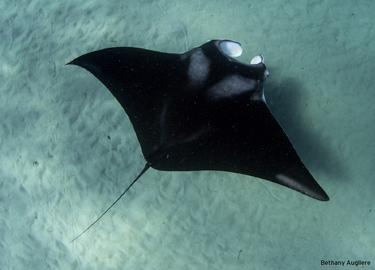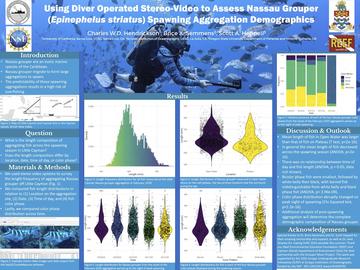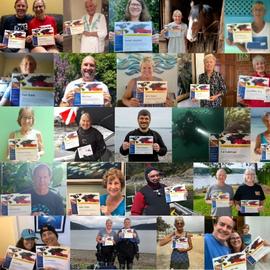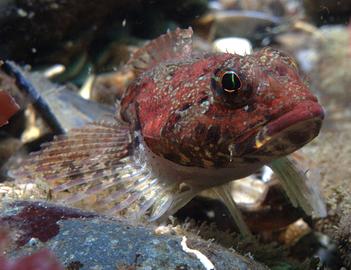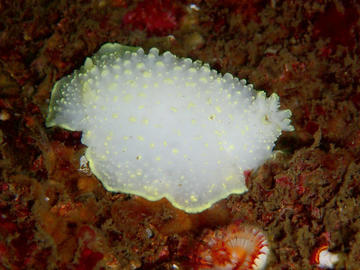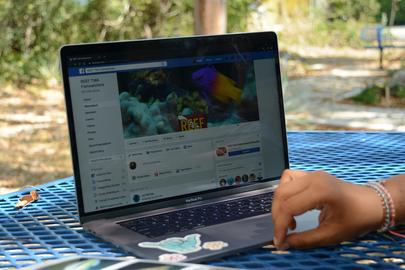Researchers from the Marine Megafauna Foundation, Jessica Pate and Andrea Marshall, show strong evidence that south Florida features a nursery ground for manta rays, only the third such special place known for the species.
In this paper, researchers from the Marine Megafauna Foundation show strong evidence that South Florida features a nursery ground for manta rays, only the third such special place known for the species. The results are surprising, given the proximity to large numbers of people and human activity. The lead author spent hundreds of hours conducting visual boat-based surveys between Jupiter Inlet and Boynton Beach between June 2016 to November 2019 in order to locate and identify individual manta rays from their color patterns and markings.
This paper, a chapter in a book on Marine Disease Ecology, focuses on global disease outbreaks that have resulted in mass mortality events that have subsequently impacted marine communities. One of the four case studies in the paper is the Sea Star Wasting Disease (SSWD) event that impacted the west coast of the US and Canada beginning in 2013. Data collected by REEF surveyors in this region on several species of echinoderms have been the basis of multiple published studies on the impact of SSWD. These studies are referenced in the book chapter.
Since the organization's earliest days, a key aspect of REEF's success has been strategic partnerships with academia, government agencies, and other non-profits. REEF has a long history of collaboration with the scientific community, starting in the early 1990s when REEF's founders worked with researchers from University of Miami, NOAA, and The Nature Conservancy to determine the best protocols for the Volunteer Fish Survey Project. There are currently four students from Scripps Institution of Oceanography at UC San Diego who are working with REEF on various data projects.
All data submitted to REEF’s Volunteer Fish Survey Project (VFSP) are housed in a publicly-assessible database that can be queried through a variety of reports on the REEF website. REEF recently partnered with Dr. Ross Robertson at the Smithsonian Tropical Research Institute (STRI) to link the online REEF Species Distribution Reports to species accounts on STRI’s online information systems, “Shorefishes of the Greater Caribbean” and “Shorefishes of the Tropical Eastern Pacific”.
This is testing how the embedding option would work.
During the summers of 2013 and 2014, populations of sea stars along the west coast from Alaska to Mexico were decimated by the sea star wasting disease (SSWD) epizootic. Two of the most highly affected species along this range were Pisaster ochraceus (the Ochre Sea Star), the most common intertidal species, and Pycnopodia helianthoides (the Sunflower Sea Star), the most common subtidal species, both of which are endemic to the US western coast.
As we shared last month, surveyor Mike Snow recently submitted the 250,000th survey to our Volunteer Fish Survey Project database. When we asked him to give us some thoughts on what he likes best about REEF, he shared a story about a time when he was buddied with fellow REEF member Greg Jensen, a marine biologist at the University of Washington and author of several reference books, including one on sculpins. Mike and Greg were part of a REEF Advanced Assessment Team project at Saltwater State Park in Washington.
REEF Citizen Science Program Manager Janna Nichols recently had the honor of having a new species of nudibranch (sea slug) named after her! Cadlina jannanicholsae is part of a difficult-to-distinguish complex of nudibranchs that was previously thought to only include Hudson’s Dorid (Acanthodoris hudsoni) and Yellow Margin Dorid (Cadlina luteomarginata). The complex is monitored by REEF surveyors in the Pacific Northwest.
April is Earth Month, and as we look forward to Earth Day on April 22, you might be looking for ways to stay connected to the environment in these uncertain times. We are all facing new and unfamiliar challenges as we adjust to this rapidly changing situation and navigate disruptions to our daily life. Here are some fun and easy activities you can do from the comfort and safety of your home:

